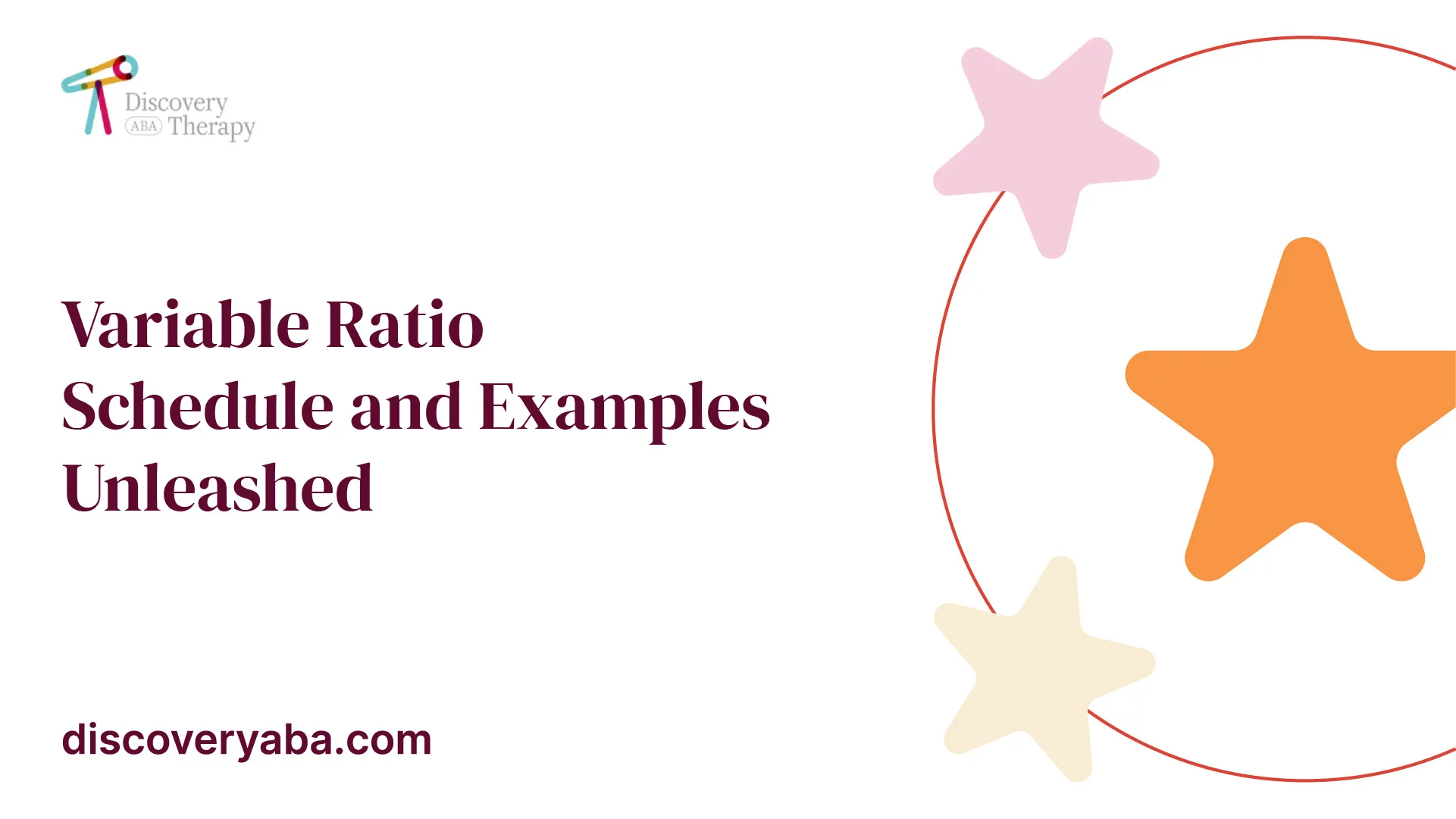Variable Ratio Schedule and Examples Unleashed
Unlock the power of variable ratio schedules! Discover examples and the influence they have on behavior, gambling, marketing, and more.

Understanding Variable Ratio Schedules
Variable ratio schedules are a type of reinforcement schedule that plays a significant role in shaping behavior. In this section, we will explore what variable ratio schedules are and provide examples to illustrate their application.
What are Variable Ratio Schedules?
In a variable ratio schedule, reinforcement is delivered after an unpredictable number of responses. Unlike fixed ratio schedules, where a set number of responses is required for reinforcement, the number of responses needed for a reward varies in a variable ratio schedule. This unpredictability makes variable ratio schedules one of the most powerful partial reinforcement schedules.
The key characteristic of a variable ratio schedule is the uncertainty surrounding the reinforcement. Individuals engaging in behaviors under a variable ratio schedule never know exactly how many responses are required before they receive a reward. This unpredictability creates a sense of anticipation and excitement, which can lead to persistent behavior patterns.

Examples of Variable Ratio Schedules
One prominent example that demonstrates the power of variable ratio schedules is gambling. Casinos utilize variable ratio reinforcement schedules in games like slot machines. Players never know precisely how many times they need to play before winning, as the reward system is unpredictable. This uncertainty of when the next reinforcement is coming makes it difficult for individuals to stop engaging in the behavior, leading to addictive patterns.
Another example of a variable ratio schedule is lottery tickets. When purchasing lottery tickets, individuals have no way of knowing how many tickets they need to buy before winning, as the rewards are distributed randomly. The allure of a potentially life-changing reward keeps individuals buying tickets, driven by the uncertainty and anticipation of a potential win.
Additionally, variable ratio schedules can be observed in sales commission structures. Rather than receiving a commission after each sale, salespeople may earn commissions after a random number of sales. This variability in the reinforcement schedule maintains high rates of responding and motivates salespeople to continue working towards the next commission, even during periods without immediate rewards.
By utilizing variable ratio schedules, businesses, casinos, and marketers can effectively reinforce behaviors and maintain high rates of responding. The variable nature of the reinforcement keeps individuals engaged and motivated, making it more challenging to extinguish the behavior. Understanding the power of variable ratio schedules helps shed light on how behaviors are shaped and maintained in various contexts.
The Power of Variable Ratio Schedules
Variable ratio schedules are an influential type of reinforcement schedule that can have significant effects on behavior. Understanding these effects is crucial in comprehending the power of variable ratio schedules and their impact on human behavior.
Effects of Variable Ratio Schedules on Behavior
Variable ratio schedules are known to result in high rates of responding and are resistant to extinguishing behaviors, making them powerful in reinforcing behaviors. The unpredictability of reinforcement in variable ratio schedules leads to persistent engagement in the behavior. This unpredictability creates an environment where individuals are uncertain about when reinforcement will occur, resulting in a continuous effort to obtain the desired outcome.
One of the significant effects of variable ratio schedules is their ability to maintain behaviors over extended periods. Due to the uncertainty of reinforcement, individuals may continue engaging in the behavior for extended periods, even when the reinforcement is infrequent. This can lead to compulsive behaviors, as individuals persist in the hope of receiving reinforcement. The high and steady response rates observed in variable ratio schedules make them highly effective in promoting consistent behavior.
Resistance to Extinction of Variable Ratio Schedules
Variable ratio schedules are the most resistant to extinction among various reinforcement schedules. Extinction refers to the process of gradually eliminating a behavior when reinforcement is no longer provided. In the case of variable ratio schedules, the uncertainty of when reinforcement will occur makes it challenging for individuals to determine when the behavior will no longer be reinforced. As a result, individuals tend to persist in the behavior for longer periods, even in the absence of reinforcement.
The resistance to extinction of variable ratio schedules is evident in various contexts. For instance, in the gambling industry, slot machines utilize variable ratio schedules to maintain high levels of engagement. The unpredictable nature of reinforcement keeps individuals engaged, even during periods of losses, as they anticipate the possibility of a win.
Understanding the effects of variable ratio schedules on behavior and their resistance to extinction is essential in comprehending their power in reinforcing behaviors. These schedules play a significant role in various contexts, including gambling, loyalty programs, and sales commission structures, where they are used to maintain behaviors effectively. The ability of variable ratio schedules to produce high and consistent rates of behavior makes them influential tools in shaping and reinforcing human behavior.
Variable Ratio Schedules in Gambling
In the realm of behavioral psychology, variable ratio schedules play a significant role in maintaining behaviors, and one prominent example of this schedule can be found in gambling. Variable ratio schedules are characterized by the unpredictability of reinforcement, where the number of responses needed for a reward varies. This unpredictability creates an addictive behavior pattern, as individuals become motivated to continue the behavior due to the uncertainty of when the next reinforcement is coming.
Gambling as an Example of Variable Ratio Schedule
Gambling serves as a prime example of a variable ratio schedule. The nature of gambling involves uncertain outcomes, where the reinforcement (winning) is unpredictable. Whether it's playing slot machines, poker, or lottery tickets, individuals engaging in gambling are often unaware of how many attempts or responses are necessary before obtaining a reward.
The allure of gambling lies in the intermittent reinforcement schedule it offers. For instance, a gambler may win after the first attempt or need to play multiple times before receiving a reward. This unpredictability keeps individuals engaged, as they strive to experience the thrill of winning, even during extended periods without reinforcement.
Slot Machines and Variable Ratio Schedules
Slot machines exemplify the variable ratio schedule's influence in the gambling context. The design of slot machines incorporates a variable ratio reinforcement schedule to maintain high rates of responding and encourage continued play. Each spin of the slot machine is met with uncertainty, as players never know when the next reinforcement (winning combination) will occur. This unpredictable nature keeps individuals engaged and contributes to the addictive nature of slot machine gambling.
The effectiveness of variable ratio schedules, like those found in slot machines, is evident in the high and steady response rates they generate. Individuals may engage in rapid and continuous play, driven by the anticipation of a potential reward, without breaks or pauses [3]. Moreover, the variable ratio schedule is highly resistant to extinction, meaning that even when reinforcement is no longer provided, the behavior persists for an extended period.
The variable ratio schedule in gambling, particularly with the use of slot machines, highlights the power of this reinforcement schedule in maintaining behavior. It demonstrates how the unpredictable nature of rewards can lead to addictive patterns and persistent engagement, making it challenging for individuals to discontinue the behavior.
Variable Ratio Schedules in Marketing
Variable ratio schedules are commonly employed in the field of marketing to maximize customer engagement and encourage repeated behaviors. By incorporating these schedules into marketing strategies, businesses can create a sense of anticipation and reward that keeps customers coming back for more. Two examples of the implementation of variable ratio schedules in marketing are loyalty programs and sales commissions.
Loyalty Programs and Variable Ratio Schedules
Loyalty programs are a prime example of how variable ratio schedules are utilized in marketing. In these programs, customers are rewarded after a random number of purchases or specific milestones, creating an element of surprise and excitement. The unpredictability of the rewards reinforces customer behavior and fosters a sense of loyalty.
By offering rewards such as discounts, exclusive access to events, or free products after a variable number of purchases, businesses can maintain high levels of customer engagement. The anticipation of receiving a reward encourages customers to continue making purchases, leading to repeated and consistent behavior [5].
Sales Commissions and Variable Ratio Schedules
Variable ratio schedules are also utilized in the realm of sales commissions. Many businesses employ these schedules to motivate sales representatives and drive consistent performance. Instead of offering a fixed commission for each sale, a variable ratio schedule rewards salespeople after an unpredictable number of successful sales.
This approach keeps sales representatives motivated as they strive to achieve the next commission milestone. By introducing an element of uncertainty, variable ratio schedules create a sense of excitement and perseverance, leading to sustained high levels of performance.
By incorporating variable ratio schedules into sales commissions, businesses can incentivize sales representatives to consistently work towards meeting and exceeding sales targets. The unpredictable nature of the rewards keeps the sales team engaged and motivated, resulting in enhanced productivity and overall sales performance.
Variable ratio schedules in marketing, whether through loyalty programs or sales commissions, tap into the human desire for anticipation and excitement. By leveraging these schedules, businesses can cultivate long-term customer loyalty and drive sustained sales growth.
The Influence of Variable Ratio Schedules
Variable ratio schedules have a significant influence on various aspects of human behavior, including social media engagement and perseverance. Let's explore these influences in more detail.
Variable Ratio Schedules in Social Media
The effectiveness of variable ratio schedules is evident in social media platforms, where users continue to engage with the platform in the hope of receiving unpredictable rewards such as likes, comments, or shares. This unpredictability creates a sense of excitement and anticipation, leading individuals to persistently interact with the platform in search of reinforcement.
Social media platforms leverage variable ratio schedules to keep users engaged and encourage them to spend more time on their platforms. The constant anticipation of receiving positive feedback or recognition fuels individuals' desire to continue posting, commenting, and sharing content. This addictive nature of variable ratio schedules in social media contributes to the sustained popularity and usage of these platforms.
Perseverance and Variable Ratio Schedules
Using a variable ratio schedule can also influence perseverance in individuals. When reinforcement is provided on a variable ratio schedule, individuals don't know exactly when their actions will be rewarded. This uncertainty creates a sense of persistence, as individuals may believe that their next attempt will be the one to yield the desired outcome.
In various contexts, such as education, work, or personal goals, individuals who experience intermittent reinforcement through a variable ratio schedule are more likely to persist in their efforts. The intermittent nature of reinforcement fosters a mindset of perseverance, as individuals are willing to put in continued effort in the hope of achieving their desired goals.
Understanding the influence of variable ratio schedules on perseverance can help individuals structure their tasks and goals in a way that keeps them motivated and engaged. By incorporating elements of uncertainty and intermittent reinforcement, individuals can maintain consistent effort and increase their chances of success.
Variable ratio schedules play a crucial role in shaping behavior in different domains, including social media engagement and perseverance. The unpredictable nature of reinforcement provided by these schedules keeps individuals engaged and motivated to continue their behaviors. Whether it's the allure of social media likes or the determination to achieve personal goals, variable ratio schedules have a profound impact on our actions and mindset.
References
- https://courses.lumenlearning.com/waymaker-psychology/chapter/reading-reinforcement-schedules/
- https://helpfulprofessor.com/variable-ratio-schedule-examples/
- https://www.simplypsychology.org/schedules-of-reinforcement.html
- https://pressbooks.online.ucf.edu/lumenpsychology/chapter/reading-reinforcement-schedules/
- https://www.verywellmind.com/what-is-a-variable-ratio-schedule-2796012
Does Your Child Have An Autism Diagnosis?
Learn More About How ABA Therapy Can Help
Find More Articles
Contact us
North Carolina, Nevada, Utah, Virginia
New Hampshire, Maine
Arizona, Colorado, Georgia, New Mexico, Oklahoma, Texas
.avif)




































































































